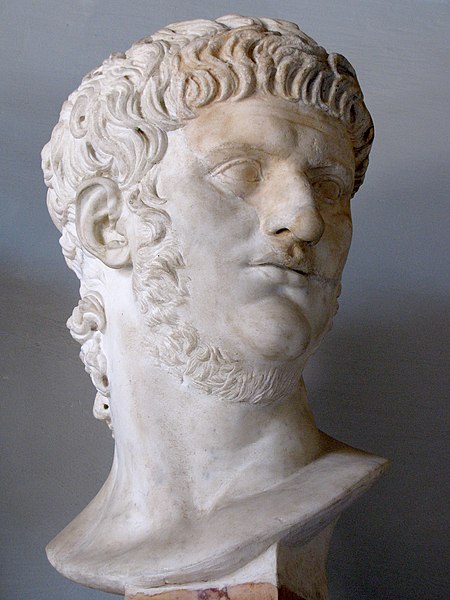Ps-Lucian, Nero 6
Menekrates: “Musonius, that voice which made him music-mad and longing for Olympian and Pythian games, how was the tyrant’s voice? Some people who sailed to Lemnos were amazed by it, others mock it.”
Musonius: “Well, Menekrates, his voice really merits neither wonder nor mockery, since nature has made him moderately and unquestionably in tune. He speaks with a naturally open and deep voice, since his throat is deep, and when he sings he buzzes a little because of his throat shape. Nevertheless, the tones of his voice make him seem smoother if he does not try too hard, but relies instead on the melody, good accompaniment, and selecting the right time to walk, to stop, to move, and to nod his head along with the music. What is shameful is that a king appears to want success in these pursuits.”
ΜΕΝΕΚΡΑΤΗΣ
6. Ἡ φωνὴ δέ, Μουσώνιε, δι᾿ ἣν μουσομανεῖ καὶ τῶν Ὀλυμπιάδων τε καὶ Πυθιάδων ἐρᾷ, πῶς ἔχει τῷ τυράννῳ; τῶν γὰρ Λήμνῳ προσπλεόντων οἱ μὲν ἐθαύμαζον, οἱ δὲ κατεγέλων.
ΜΟΥΣΩΝΙΟΣ
Ἀλλ᾿ ἐκεῖνός γε, ὦ Μενέκρατες, οὔτε θαυμασίως ἔχει τοῦ φθέγματος οὔτ᾿ αὖ γελοίως· ἡ γὰρ φύσις αὐτὸν ἀμέμπτως τε καὶ μέσως ἥρμοκε. φθέγγεται δὲ κοῖλον μὲν φύσει καὶ βαρύ, ἐγκειμένης αὐτῷ τῆς φάρυγγος· μέλη δ᾿ οὕτω κατεσκευασμένης βομβεῖ πως. οἱ δέ γε τόνοι τῶν φθόγγων ἐπιλεαίνουσι τοῦτον, ἐπεὶ μὴ θαρρεῖ αὑτῷ, χρωμάτων δὲ φιλανθρωπίᾳ καὶ μελοποιίᾳ εὐαγώγῳ μὲν δὴ καὶ κιθαρῳδίᾳ εὐσταλεῖ καὶ <τῷ> οὗ καιρὸς βαδίσαι καὶ στῆναι καὶ μεταστῆναι καὶ τὸ νεῦμα ἐξομοιῶσαι τοῖς μέλεσιν, αἰσχύνην ἔχοντος μόνου τοῦ βασιλέα δοκεῖν ἀκριβοῦν ταῦτα.
Suetonius, Lives of the Caesars: Nero 53, 55
“He was mostly deranged by a desire for popularity and was an enemy to anyone who had any sway over the popular mob. Most believed that after all of his accomplishments on the stage he was going to compete among the Athletes at the next Olympian games. He was wrestling endlessly and he had watched the gymnastic contests all over Greece as a judge would, sitting on the ground of the stadium. If any competitors withdrew too far back, he would push them forth again with his own hand. Because he was alleged to have equaled Apollo in song and the Sun in chariot-driving, Nero planned to rival the deeds of Herakles too. People claim that a lion had been trained which he would be able to kill naked in the amphitheater in front of all the people with either a club or his arms’ embrace.”
Maxime autem popularitate efferebatur, omnium aemulus, qui quoquo modo animum vulgi moverent. Exiit opinio post scaenicas coronas proximo lustro descensurum eum ad Olympia inter athletas; nam et luctabatur assidue nec aliter certamina gymnica tota Graecia spectaverat quam brabeutarum more in stadio humi assidens ac, si qua paria longius recessissent, in medium manibus suis protrahens. Destinaverat etiam, quia Apollinem cantu, Solem aurigando aequiperare existimaretur, imitari et Herculis facta; praeparatumque leonem aiunt, quem vel clava vel brachiorum nexibus in amphitheatri harena spectante populo nudus elideret.
“He had a desire for eternal and endless fame, but it was ill-considered. Because of this he changed the names of many things and places from their ancient titles to something from his own name. So, he called the month of April Neroneus and planned to have Rome renamed Neropolis.”
Erat illi aeternitatis perpetuaeque famae cupido, sed inconsulta. Ideoque multis rebus ac locis vetere appellatione detracta novam indixit ex suo nomine, mensem quoque Aprilem Neroneum appellavit; destinaverat et Romam Neropolim nuncupare.

